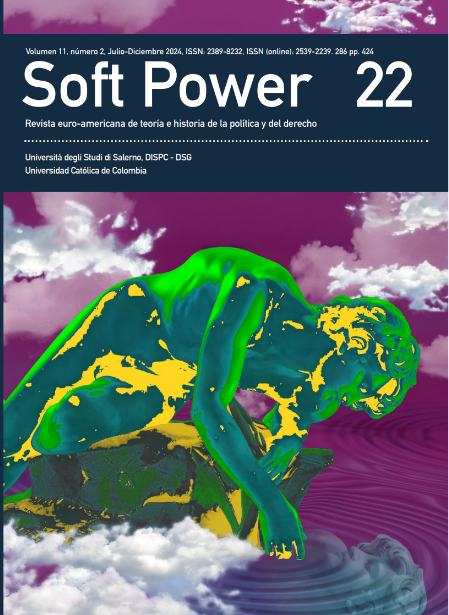
Esta obra está bajo una licencia internacional Creative Commons Atribución-NoComercial 4.0.
Al enviar los artículos para su evaluación, los autores aceptan que transfieren los derechos de publicación a Soft Power. Revista Soft Power para su publicación en cualquier medio. Con el fin de aumentar su visibilidad, los documentos se envían a bases de datos y sistemas de indización, así mismo pueden ser consultados en la página web de la Revista.Resumen
Este artículo explora las posibilidades de una participación digital autónoma de las grandes plataformas comerciales. En primer lugar, se cuestiona el valor democrático del actual entorno digital dominado por los gigantes tecnológicos en una era marcada
por el individualismo y la despolitización. A continuación, se analizan tres modelos de participación democrática a través de plataformas alternativas a las comerciales. El primero es el modelo representativo, que busca la innovación de los partidos a través de la tecnología. El segundo es el modelo participativo, que enfatiza el compromiso directo de los ciudadanos a través de plataformas cívicas. El tercero es el modelo deliberativo, que propone un proceso de toma de decisiones basado en una muestra aleatoria representativa, el cual activa un proceso de deliberación inclusivo utilizando también las TIC. En conclusión, el artículo discute, mediante el uso de ejemplos mentales, los retos de integrar estas formas en un sistema que responda a las necesidades actuales de la democracia.
Palabras clave

Citas
Ackerman, B. & Fishkin, J.S. (2005). Deliberation Day. Yale University Press.
Barber, B. (1984). Strong democracy: Participatory politics for a new age. University ofCalifornia Press.
Bauman, Z. (2013). Liquid modernity. John Wiley & Sons.
Beck, U. (1992). Risk Society. Sage.
Bennett, C.J. (2012). Privacy advocates, privacy advocacy and the surveillance society.
In K. Ball, K. Haggerty & D. Lyon (Eds.), Routledge handbook of surveillance studies.Routledge. https://doi.org/10.4324/9780203814949.ch4_2_c
Bonini, T. & Treré, E. (2024) Algorithms of Resistance. MIT Press. https://doi.org/10.7551/mitpress/14329.001.0001
Chadwick, A. (2007). Disintermediation. In M. Bevir (ed.). The Encyclopedia of Governance.Sage.
Coleman, S. & Blumler, J. (2009). The Internet and democratic citizenship. CambridgeUniversity Press.https://doi.org/10.1017/CBO9780511818271
Crouch C. (2004). Post-democracy. Polity.
De Blasio, E. (2018). Il governo online. Carocci.
De Nadal, L. (2023). Populism and plebiscitarianism 2.0: How Podemos used digital platforms for organization and decision-making. New Media & Society, 25(11),2961-2980. https://doi.org/10.1177/14614448211038763
Diamond, L., & Gunther, R. (2002). Political parties and democracy. Johns Hopkins University Press. https://doi.org/10.56021/9780801877841 Durkheim, E. (1893/2014). The division of labor in society. Simon and Schuster.
Eliasoph, N. (2011). Making volunteers: Civic life after welfare’s end. Princeton University Press. https://doi.org/10.23943/princeton/9780691147093.001.0001
Feenstra, R., Tormey, S., Casero-Ripollés, A., & Keane, J. (2017). Refiguring Democracy.The Spanish Political Laboratory. Routledge. https://doi.org/10.4324/9781315160733
Fishkin, J.S. (1995). The Voice of the People. Public Opinion and Democracy, Yale University Press.
Garon, J.M. (2009). Reintermediation. International Journal of Private Law, 2(3), 227-243. https://doi.org/10.1504/IJPL.2009.024140
Gerbaudo P. (2017). The Mask and the Flag. Hurst & Co.
Gerbaudo, P. (2018). The Digital Party. Pluto Press. https://doi.org/10.2307/j.ctv86dg2g
Giacomini, G. (2022). To be or not to be ‘Rousseauian’. The rise and fall of ‘digital utopianism’ in the Five Star Movement. eJournal of eDemocracy and Open Government,14(2), 149-166. https://doi.org/10.29379/jedem.v14i2.704
Giacomini, G. (2023). Disintermediation and/or Neointermediation?. Polish Sociological Review, 222(2), 249-262.
Gray-Hawkins, M. (2018). Collective movements, digital activism, and protest events. Geopolitics, History, and International Relations, 10(2), 64-69. https://doi. org/10.22381/GHIR10220188
Habermas, J. (1962/1989). The structural transformation of the public sphere. The MIT Press.
Halperin, Y. (2022), Reclaiming the People. Counter-Populist Algorithmic Activism
on Israeli Facebook, Television & New Media, 24(1), 71-87. https://doi.org/10.1177/15274764211059462
Hosterman, A.R., Johnson, N.R., Stouffer, R., & Herring, S. (2018). Twitter, social support messages, and the #MeToo movement. The Journal of Social Media in Society, 7(2), 69-91.
Jackson, S.J., Bailey, M., & Foucault Welles, B. (2020), #HashtagActivism. Networks of Race and Gender Justice. MIT Press. https://doi.org/10.7551/mitpress/10858.001.0001
Kahneman, D. (2011). Thinking, fast and slow. Macmillan.
Lee, C. W. (2015). Do-it-yourself democracy: The rise of the public engagement industry. Oxford University Press. https://doi.org/10.1093/acprof:oso/9780199987269.001.0001
Magatti, M. (2012). La grande contrazione, Feltrinelli.
Mair, P. (2013). Ruling the Void: The Hollowing of Western Democracy. Verso.
Mansell, R. (2016). Power, hierarchy and the internet. Global Studies Journal, 9(2), 19- 25. https://doi.org/10.18848/1835-4432/CGP/v09i02/19-25
Martinez Sainz, G. & Hanna, A. (2023). Youth digital activism, social media and human rights education: the Fridays for Future movement, Human Rights Education Review, 6(1), 116-136. https://doi.org/10.7577/hrer.4958n
Mazzucato, M. (2013). The entrepreneurial state. Anthem Press.
Nez, H. (2012). Délibérer au sein d’un mouvement social: Ethnographie des assemblées des indignés à Madrid. Participations, 4(3), 79–102 https://doi.org/10.3917/parti.004.0079
Ohlheiser, A.W. (2020). How K-pop fans became celebrated online vigilantes. MIT Technology Review, 5 june.
Pateman, C. (2012). Participatory democracy revisited. Perspectives on politics, 10(1), 7-19. https://doi.org/10.1017/S1537592711004877
Ruppert, E., Isin, E., & Bigo, D. (2017). Data Politics. Big Data & Society, 4(2), 1-7. https://doi.org/10.1177/2053951717717749
Slonecker, B. (2017). The Counterculture of the 1960s and 1970s. In Oxford Research Encyclopedia of American History. Oxford University Press. https://doi.org/10.1093/acrefore/9780199329175.013.392
Taylor-Gooby, P., & Leruth, B. (2018). Individualism and neoliberalism. In Attitudes, aspirations and welfare: Social policy directions in uncertain times. Springer, 29-61. https://doi.org/10.1007/978-3-319-75783-4_2
Tronconi, F. (2015). Beppe Grillo’s Five Star Movement: Organisation, Communication and Ideology. Ashgate Publishing. https://doi.org/10.4324/9781315569062
Tufekci, Z. (2017), Twitter and Tear Gas: The Power and Fragility of Networked Protest. Yale University Press.
Way L. (2021), Analysing Politics and Protest in Digital Popular Culture. Sage. https://doi.org/10.4135/9781529753158
Yang, G. (2016). Narrative Agency in Hashtag Activism: The Case of #BlackLivesMatter, Media and Communication, 4(4), 13-17. https://doi.org/10.17645/mac.v4i4.692
Zimmermann, E. (2015). Social movements and political outcomes: why both ends fail to meet. Annales Universitatis Mariae Curie-Skłodowska, 22(1), 31-49. https://doi.org/10.17951/k.2015.22.1.31










